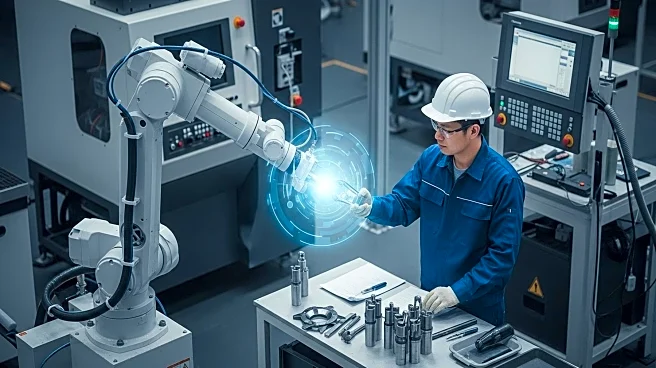What's Happening?
In the Bay Area, workforce consultant Michael Bernick has noted a resurgence in blue-collar jobs as artificial intelligence increasingly threatens white-collar positions. Bernick, a former head of California's Employment Development Department, points out that more than half of college graduates in the state are currently employed in jobs that do not require a college degree. This shift is attributed to the growing impact of AI, which is replacing human workers with digital assistants, particularly in sectors like engineering. Salesforce CEO Mark Benioff has acknowledged the productivity gains from AI, suggesting a potential halt in hiring engineers due to these advancements. Meanwhile, institutions like Los Medanos College are emphasizing the importance of trade skills, which remain resilient against AI replacement.
Why It's Important?
The resurgence of blue-collar jobs signifies a critical shift in the job market, where traditional white-collar roles are increasingly vulnerable to automation. This trend could reshape educational priorities, encouraging more students to pursue trade skills that offer job security in an AI-driven economy. The shift also highlights the need for policy adjustments to support workforce transitions and address the stigma associated with blue-collar professions. As AI continues to evolve, industries may need to reassess their workforce strategies, potentially leading to broader economic implications and changes in employment patterns.
What's Next?
As AI technology continues to advance, companies may increasingly rely on digital labor, potentially reducing the demand for certain white-collar roles. This could lead to a reevaluation of educational pathways, with more emphasis on vocational training and trade skills. Workforce consultants and educational institutions may need to adapt their programs to meet the changing demands of the job market. Additionally, policymakers might consider initiatives to support workers transitioning from white-collar to blue-collar roles, ensuring economic stability and job security in the face of technological disruption.
Beyond the Headlines
The shift towards blue-collar jobs amid AI advancements raises ethical and cultural questions about the value placed on different types of work. It challenges the traditional narrative that equates higher education with better job prospects, potentially leading to a cultural reevaluation of career paths. This development also underscores the importance of human skills that cannot be replicated by machines, such as creativity, empathy, and interpersonal communication, which may become increasingly valuable in the workforce.










